Pubished in
Lawyer Magazine, May 2009
Courts have a liberal policy of setting aside clerk’s defaults in favor of trying cases on their merits. For this reason, opposing counsel often agree to the vacating of clerk’s defaults, especially when the responsive pleading was only slightly tardy and a default judgment has not yet been entered. But when opposing counsel do not agree to having the clerk’s default set aside, the defendant will need to explain to the court why the default should be vacated. The defendant must show (1) the default is the result of excusable neglect; (2) the defendant has a meritorious defense; and (3) the defendant has been diligent in seeking relief. Johnson v. Johnson, 845 So. 2d 217, 220 (Fla. 2d DCA 2003).
The second and third elements often are satisfied easily by the defense attorney filing a responsive pleading on the day he or she learns of the clerk’s default. However, the first element may require an affidavit from the client. It is this excusable neglect element that can create a catch-22 situation: the client likely will not want to admit he or she was neglectful, but without such an admission and an accompanying explanation, the court will be unable to determine whether the neglect was excusable. When the default is caused by the client’s failure to timely provide suit papers to outside counsel, the client may need to be reassured that admitting to and explaining this neglect is the way out of the clerk’s default, and that the standard for establishing excusable neglect is very low.
Florida courts routinely have ruled that “a failure to follow corporate policy for handling lawsuits constitutes excusable neglect.” Mercury Marine Indus., Inc. v. Dillon, 779 So. 2d 356, 357 (Fla. 2d DCA 2000). In Okeechobee Imports, Inc. v. American Savings and Loan Association of Florida, 558 So. 2d 506 (Fla. 3d DCA 1990), a defendant’s registered agent forwarded the complaint to the defendant’s business office, but it was filed away in the wrong file and not timely delivered to outside counsel. The appellate court ruled this amounted to excusable neglect and set aside the default that had been entered at the trial level.
Similarly, the Second DCA found excusable neglect when the late response was due to a “clerical error” in routing the complaint from corporate staff to outside counsel. Lindell Motors, Inc. v. Morgan, 727 So. 2d 1112, 113 (Fla. 2d DCA 1999). The Third DCA found excusable neglect when the suit papers were lost on the desk of the corporate defendant’s general counsel. Carter, Hawley, Hale Stores, Inc. v. Whitman, 516 So. 2d 83, 83-84 (Fla. 3d DCA 1987). It also found excusable neglect where a defendant doctor mistook suit papers for a records subpoena. Hanft v. Church, 671 So. 2d 249, 250 (Fla. 3d DCA 1996). And on one occasion, the Second DCA found excusable neglect when all the defendant could say was that, for some unknown reason, its former employee apparently failed to transmit the complaint to outside counsel. Marshall Davis, Inc. v. Incapo, Inc., 558 So. 2d 206, 207 (Fla. 2d DCA 1990). Cases such as these may put a client at ease in admitting that its actions were neglectful, though excusable.








